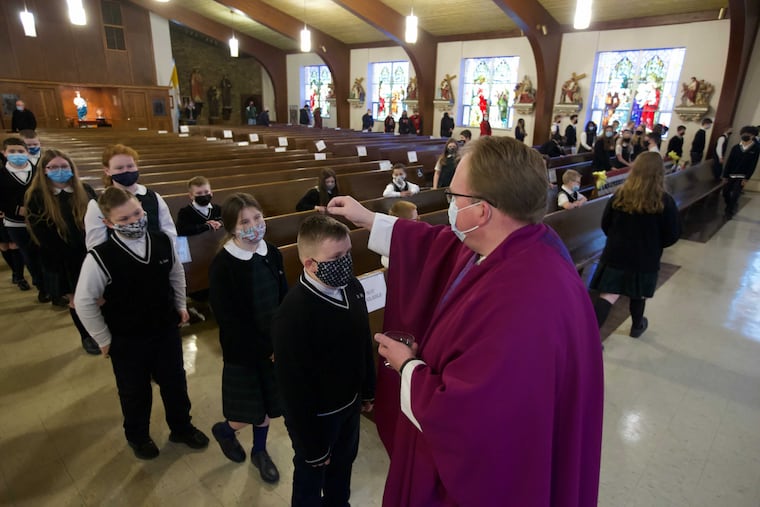Philly Christians to mark Ash Wednesday with to-go rituals, livestream services, and masked Masses
“This year, while different, will be the same beginning of the Lenten season, the same reminder, of how we are dust and unto dust we shall return.”

Like nearly everything else in a world upended by the coronavirus pandemic, Ash Wednesday, the Christian day of repentance and prayer, will look a bit different for Adam Nagel and his family this year.
Instead of Mass at St. Patrick’s Roman Catholic Church, Nagel, his partner, and her son will observe the start of Lent over Zoom in Graduate Hospital, with a pancake dinner and readings from the New and Old Testaments.
Nagel, 35, who came to Catholicism in 2018 and completed his initiation classes this time last year, mourns not receiving ashes in church this time, as they symbolize one of the first ways he participated with his new congregation.
“It felt like a huge part of my experience initially because I was able to, to really take part in this ritual with the rest of the community,” he said. “And that’s the one thing that I missed the most, that sense of community through the church throughout this past year.”
Following guidance from the Vatican aimed at mitigating the spread of the coronavirus, Philadelphia’s Archdiocese has offered parishes the option to sprinkle ashes on its faithful’s heads without saying anything rather than swiping a cross on their foreheads. Churches can also apply ashes to the forehead with a cotton ball. Still others, like the Cathedral Basilica of SS. Peter and Paul, will impose ashes on the forehead as usual, said the Rev. Dennis Gill, director of the archdiocese’s Office for Divine Worship.
In a livestreamed service, congregants will follow the Vatican’s guidelines, refraining from saying anything while receiving the ashes blessed by a priest, a reminder of one’s mortality. Unlike years past, but now a standard practice in the pews, the faithful will sit masked and six feet apart. The priest will offer a singular blessing to the group: “Remember that you are dust, and to dust you shall return.”
In a memo addressing the modifications, the archdiocese noted that distributing blessed packets of “ashes to-go” would not be permitted.
“The more important message of Ash Wednesday is not the ashes but the Gospel to turn away from sin and be faithful to the gospel,” said Gill, emphasizing the importance to Catholics of having a priest administer ashes, accompanied by “the word of God.”
Sprinkling ashes over a person’s head, Gill noted, is the typical way ashes are administered in many parts of the world, and the United States is an exception. The Diocese of Camden, too, will follow suit.
“This is something we’re doing to maintain the protocols that have been set before us and especially the protocols of the Vatican. This is a practice that’s done throughout Europe and throughout most of the world,” said the Rev. Adam Cichoski, director of the diocese’s vocations, in a video address. “This year, while different, will be the same beginning of the Lenten season, the same reminder, of how we are dust and unto dust we shall return.”
St. Martha’s Parish in Northeast Philadelphia will also observe the contactless sprinkling of ashes on people’s heads, said the Rev. Jonathan Dalin, as well as cleaning the church thoroughly between services and encouraging social distancing. The church will administer ashes in envelopes to those who are homebound, Dalin said, to “make sure they’re spiritually taken care of.”
Other area parishes, like the Presbyterian Church of Chestnut Hill, will offer drive-through “ashes to go,” where the faithful can roll through the church’s porte cochere during set time periods and receive a small container of ashes and share a prayer at a distance. In addition to “Zoom Room” services, Prince of Peace Lutheran Church in Marlton distributed a booklet for those observing Ash Wednesday at home.
“You may prepare for this service of prayer at home by finding a place to pray and lighting a candle there,” it says. “You may also set out a bowl of ashes, a bowl of soil, or a bowl of water.”
“I would rather be in church on Ash Wednesday, and I liked the idea of the priests rubbing the ash on my head. That’s very sacred to me,” said journalist Chris Murray, host of The Chris Murray Report on WURD Radio, calling the season “the one time ... I try to be a good Catholic.”
But this year, due to the coronavirus, he will tune in to a streamed service and forgo receiving his ashes in person at St. Cyprian Roman Catholic Church in West Philadelphia.
“It is one of those things that we’ve got to make a spiritual accommodation,” Murray, 58, said, “because I certainly do not want to get COVID-19. Nor do I want to put others in danger of getting COVID-19.”
Last year, Dalin noted, Ash Wednesday fell in the final moments of normalcy before the virus gripped the Philadelphia region and the world. The holy day happened one day after federal leaders warned Americans to brace for the spread of the virus, but before much of the country went into lockdown.
The period that followed, Dalin said, as the world ground to a halt, “was an odd Lent, but very spiritually fruitful. The prayer life was very focused, obviously, on caring for your people, and doing what you can.”
This year, with the promise of a vaccine, he said, “brings in a season of hope, too, coming in with everything that’s happening.”
“So maybe there is a light at the tunnel, and it’s not a train.”